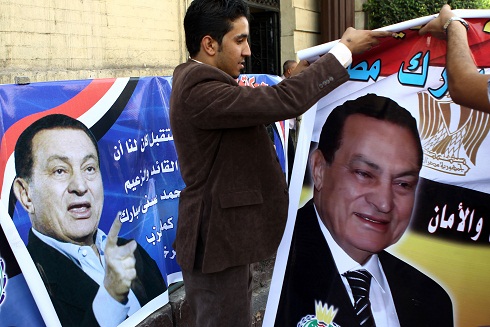Convicted ex-president Hosni Mubarak has been suffering from worsening health problems since he received a life prison sentence on 2 June, when he was found guilty of complicity in killing protesters.
In the early morning hours of Wednesday it was briefly uncertain whether the ousted president was dead or alive. What remained a certainty, though, was the fact that he was moved from prison to an army hospital follow- ing his latest health stroke.
Prompted by reports by the Middle East News Agency (MENA) it was circulated by several news agencies that Mubarak had actually died. During the night the story became more complex, and it was reported that he was defibrillated several times, had possibly suffered several strokes, had slipped into a coma, or was clinically dead- as in only his organs failed but not his brain was functional. By morning, Mubarak’s health had ‘normalised.‘
Because his health is so frequently in question it is fair or Egyptians to ask in the event of his death, what kind of funeral awaits the ousted president? “Legally speaking, since he’s been convicted, now he’s stripped off all his previous titles and decorations.” Gamal Eid, executive director of the Arabic Network for Human Rights Information (ANHRI), told the Daily News Egypt.
“He would get a ‘family’ funeral, nothing more, just like any other prisoner,” Eid further stressed.
Major General Sayed Hashem, ex- Military Attorney General, also verified Eid’s suggestion of a normal funeral, telling independent daily Al-Shorouk that according to article 25 of the penal code, any prisoner convicted with a criminal penalty is stripped off all his titles and decorations.
Anyone following the events in Egypt could tell you that the health of the ousted President has become a national headline since his departure. In the last month alone it has been reported that Mubarak has been put on a ventilator at least five times, which is dubious because of the medical improbability.
The irony here lies with how the issue of Mubarak’s health, and death, had long been a taboo during his 30 years Parliament of rule. When he underwent surgery in 2010, the media maintained a careful narrative, all that could be reported was the he had a ‘very successful’ gallbladder surgery

in Germany with images documenting healthy recovery in hospital. Rumours circulated that the President was suffering from a much more critical condition, yet none dared to mention it publicly. Prominent journalist Ibrahim Eissa was tried and convicted in September 2008 for the crime of ‘publishing false news about the president’s health in a manner which harms national security’. Eissa, then editor-in-chief of private-owned newspaper Al-Dostor, ran an article questioning whether Mubarak’s health was deteriorating.
Many now observe any news of Mubarak’s health with scepticism, his frequent brushes with death are editorialized in several online cartoons. Due to Mubarak’s bad turns in health frequently coincided with times of political upheaval, news appears to serve as an effective distraction, or a political tranquiliser pill. Ahmed Salama believes Mubarak’s death is being manipulated, “I have a feeling that he has actually been dead for a while, otherwise why would they transport him to the hospital using a car when he is in critical condition, while he was transported to the trials using by plane. They don’t want to announce the news of his death until they announce the next president.“ Still, talking about Mubarak’s health changed from being a serious taboo subject to a matter of public debate, which is even encouraged by his own legal team. The widespread coverage reflects the fascination of watching the demise of a man held in awe and fear for so many years.
Moneera Kassab is ambivalent about Mubarak’s death, he said he feels “nothing, the news of his death does not have an impact on the events going on right now. Mubarak’s role in the country is over.
